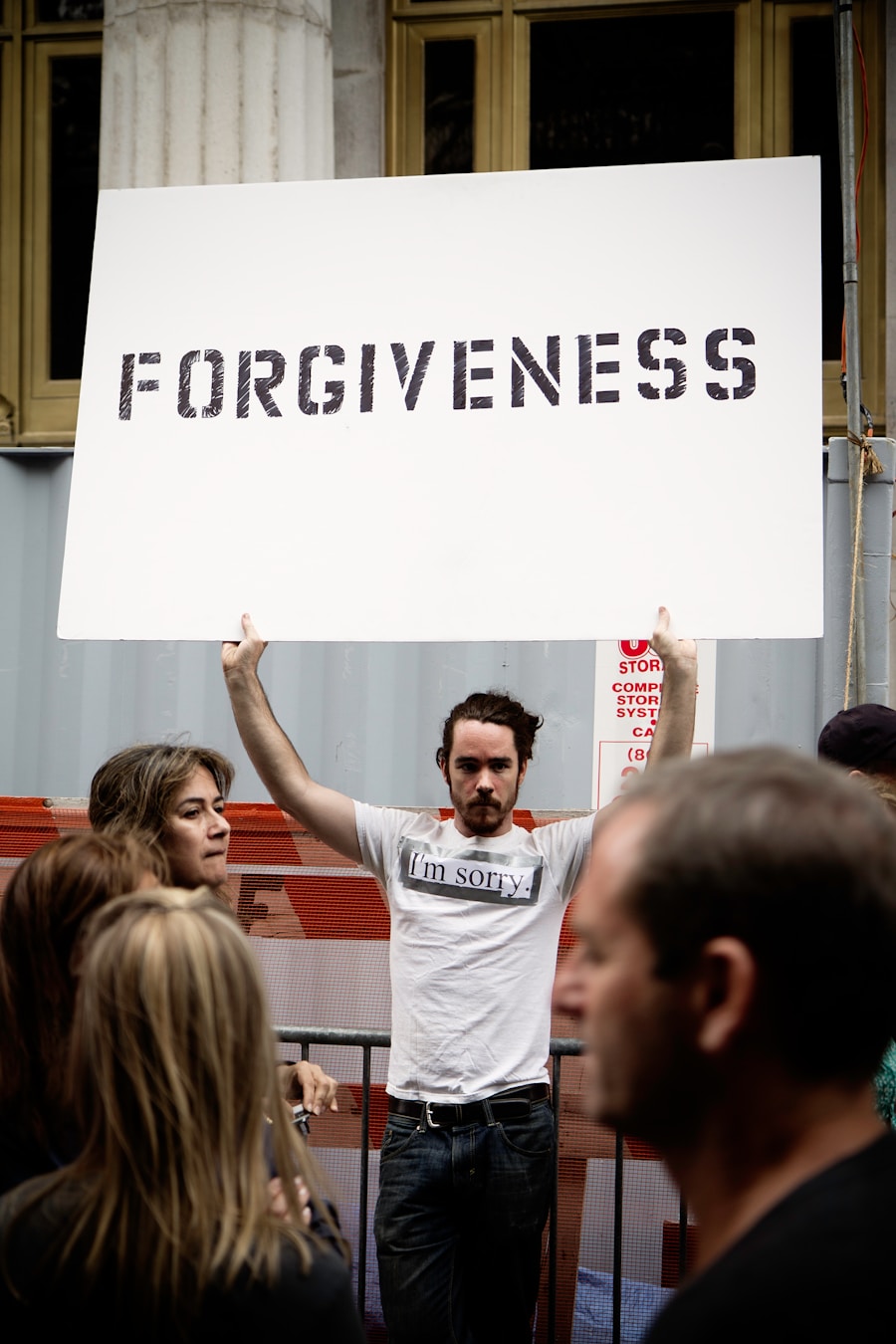Forgiveness is a complex and often misunderstood concept. At its core, it involves letting go of resentment and the desire for retribution against someone who has wronged you. It’s not about condoning the behavior or forgetting the hurt; rather, it’s a conscious decision to release the emotional burden that comes with holding onto anger.
You may find that forgiveness is more about your own peace of mind than about the person who caused you pain. It’s a personal journey that can lead to profound emotional healing. When you choose to forgive, you are not only freeing the other person from the weight of your anger but also liberating yourself.
This act can be incredibly empowering, allowing you to reclaim your emotional well-being. Understanding forgiveness means recognizing that it is a process, often requiring time and reflection. It’s essential to acknowledge your feelings and the impact of the hurtful actions before you can genuinely move toward forgiveness.
This journey is unique for everyone, and it’s important to honor your own timeline as you navigate through it.
Key Takeaways
- Forgiveness is a conscious decision to let go of feelings of resentment and anger towards someone who has wronged you.
- The benefits of forgiveness include improved mental and physical health, reduced stress, and better relationships.
- Empathy plays a crucial role in forgiveness, as it allows us to understand the perspective of the person who hurt us.
- Overcoming barriers to forgiveness involves acknowledging and processing our emotions, practicing empathy, and letting go of the need for revenge.
- Practicing self-forgiveness is essential for personal growth and healing, and involves accepting our mistakes and showing compassion towards ourselves.
The Benefits of Forgiveness
The benefits of forgiveness extend far beyond the emotional realm; they can significantly impact your physical health as well. Research has shown that holding onto grudges can lead to increased stress, anxiety, and even physical ailments such as high blood pressure and heart disease. When you embrace forgiveness, you may experience a reduction in these stress-related symptoms, leading to a healthier and more balanced life.
You might find that letting go of past grievances allows you to breathe easier and feel lighter, both mentally and physically. Moreover, forgiveness can enhance your relationships with others. When you forgive someone, you create space for healing and understanding, which can strengthen your connections with those around you.
You may notice that your interactions become more positive and fulfilling as you let go of past grievances. This shift not only benefits your relationships but also fosters a sense of community and support in your life. By choosing forgiveness, you open the door to deeper connections and a more harmonious existence.
The Role of Empathy in Forgiveness

Empathy plays a crucial role in the process of forgiveness. When you can put yourself in someone else’s shoes, it becomes easier to understand their actions and motivations. This understanding doesn’t excuse their behavior but allows you to see them as a flawed human being rather than a villain.
By cultivating empathy, you may find that your anger begins to dissipate, replaced by compassion for their struggles and shortcomings. This shift in perspective can be transformative, paving the way for genuine forgiveness. As you practice empathy, consider reflecting on your own imperfections and mistakes.
Recognizing that everyone is capable of causing harm can help you approach forgiveness with a more open heart. You might find that acknowledging your own vulnerabilities fosters a sense of connection with others, making it easier to forgive them for their transgressions. Empathy not only enriches your understanding of others but also deepens your capacity for forgiveness, allowing you to move forward with grace and understanding.
Overcoming Barriers to Forgiveness
| Barriers to Forgiveness | Percentage |
|---|---|
| Lack of Empathy | 35% |
| Fear of Vulnerability | 20% |
| Anger and Resentment | 25% |
| Trust Issues | 15% |
| Self-Blame | 5% |
Despite its many benefits, forgiveness can be challenging due to various barriers that may arise along the way. One common obstacle is the fear of vulnerability. You might worry that forgiving someone will make you appear weak or expose you to further hurt.
It’s essential to recognize that forgiveness is not about relinquishing your power; rather, it’s an act of strength that allows you to take control of your emotional landscape. By confronting these fears head-on, you can begin to dismantle the barriers that stand in the way of your healing. Another significant barrier is the belief that forgiveness means forgetting or excusing the behavior that caused you pain.
This misconception can prevent you from moving forward, as it may feel like an injustice to let go of your anger without acknowledgment of the wrongdoing. To overcome this barrier, remind yourself that forgiveness is a personal choice that benefits you, regardless of whether the other person acknowledges their actions. By reframing your understanding of forgiveness, you can create a pathway toward healing that honors both your feelings and your journey.
Practicing Self-Forgiveness
Self-forgiveness is an essential aspect of the overall forgiveness process. Often, we are our harshest critics, holding onto guilt and shame for our own perceived failures or mistakes. To practice self-forgiveness, start by acknowledging your feelings without judgment.
Understand that everyone makes mistakes; it’s part of being human. By allowing yourself the grace to be imperfect, you create space for healing and growth. As you embark on this journey of self-forgiveness, consider reflecting on what you’ve learned from your experiences.
Instead of dwelling on past mistakes, focus on how they have shaped you into a stronger person. This shift in perspective can help you cultivate compassion for yourself, making it easier to let go of guilt and embrace a more forgiving mindset. Remember that self-forgiveness is not about absolving yourself of responsibility; it’s about recognizing your humanity and allowing yourself to move forward with kindness.
Rebuilding Trust After Forgiveness

Rebuilding trust after forgiveness can be a delicate process, especially if the hurt was significant. Trust is often seen as a fragile entity; once broken, it requires time and effort to restore. As you navigate this journey, it’s crucial to communicate openly with the person involved.
Share your feelings and concerns while also expressing your desire to rebuild the relationship. This transparency can lay the groundwork for renewed trust and understanding. Additionally, be patient with yourself and the other person as you work toward rebuilding trust.
It’s natural for doubts and insecurities to arise during this process; however, consistent actions over time can help reinforce trustworthiness. You might find that small gestures of reliability and accountability go a long way in restoring faith in one another. By committing to this process together, you create an environment where trust can flourish once again.
Cultivating a Forgiving Mindset
Cultivating a forgiving mindset requires intentional effort and practice. Start by incorporating mindfulness into your daily routine; this can help you become more aware of negative thoughts and feelings as they arise. When you notice resentment or anger creeping in, take a moment to pause and reflect on how these emotions affect your well-being.
By acknowledging these feelings without judgment, you create an opportunity for growth and healing. Another effective strategy is to practice gratitude alongside forgiveness. Focusing on what you appreciate in your life can shift your perspective away from negativity and resentment.
Consider keeping a gratitude journal where you regularly jot down things you are thankful for, including positive experiences or lessons learned from difficult situations. This practice can help reinforce a forgiving mindset by reminding you of the good in your life and encouraging a more compassionate outlook toward others.
Seeking Professional Help for Forgiveness
Sometimes, the journey toward forgiveness can feel overwhelming or insurmountable on your own. In such cases, seeking professional help can be incredibly beneficial. A therapist or counselor can provide guidance and support as you navigate complex emotions related to forgiveness.
They can help you explore underlying issues that may be contributing to your struggles with letting go of anger or resentment. Working with a professional allows for a safe space where you can express your feelings without fear of judgment. They can offer valuable tools and techniques tailored to your unique situation, helping you develop healthier coping mechanisms and strategies for forgiveness.
Remember that seeking help is not a sign of weakness; rather, it demonstrates strength and commitment to your emotional well-being. Embracing this support can lead to profound healing and transformation on your path toward forgiveness. In conclusion, forgiveness is a multifaceted journey that encompasses understanding, empathy, self-reflection, and sometimes professional guidance.
By embracing this process with an open heart and mind, you can unlock the many benefits it offers—both for yourself and those around you. As you cultivate a forgiving mindset and work through barriers, remember that each step taken is a step toward greater peace and emotional freedom.
